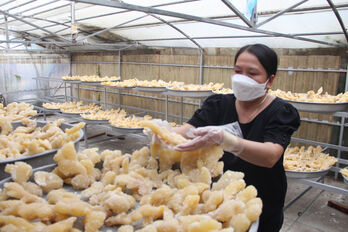
Illustrative image (Source: bacgiang.gov.vn)
According to the provincial Department of Agriculture and Rural Development, the province has applied a closed production cycle to make full use of by-products and wastes from livestock for cultivation and vice versa.
Alongside, the province has stepped up mechanisation in agricultural production, especially in stages with low degree of mechanisation such as planting, fertilising, and pesticide spraying to reduce input costs and improve competitiveness of agricultural products, while strengthening inspection of agricultural materials and replicating effective digital transformation models.
Bac Giang has focused on supporting local farmers in selling their products, especially 'thieu' litchi, making well preparations in varieties and materials serving rice production in the upcoming crop, and building plans for the production of the winter crop in parallel with taking care of fruit farms and maintaining livestock production, especially chickens and pigs.
The province has also braced for the stormy season to ensure the operation of irrigation work and dyke system, thus protecting farms.
The department reported that in the first six months of this year, the province faced great difficulties in markets, especially in China, one of the major export markets of Vietnam due to the country’s application of “Zero-COVID” policy. At the same time, the Russia-Ukraine conflict has resulted in the crackdown of supply chains and pushed input material prices up.
Statistics showed that in the period, fertilizer prices increase 30-50%, while the prices of pesticides rose 10-20%, and that of animal feed was up 15%-20% over the same period in 2021, leading to a hike in production costs and an increase in the prices of agricultural products, affecting farmers' plan on investment and livestock re-herding and aquaculture production.
In that context, the local agricultural sector has proposed a number of policies to support agricultural production and assist farmers by helping them obtain good agricultural practice certificates, providing with financial support to make analysis of pesticide residues in litchi, and supplying them with equipment and animal vaccines.
Besides, Bac Giang has held training courses for farmers to apply effective methods to reduce input costs and take advantage from available raw materials as feed in livestock.
As a result, many effective farming models have been multiplied, including the use of drones in sowing and spraying pesticides in Tan Yen district, which saves 61% of labour costs and 20% of pesticides compared to conventional practices, and a model of rice production applying System of Rice Intensification (SRI) with an area of 28,000 hectares, reducing the costs of input materials by 20-30% and increasing production efficiency by 20-25% compared to traditional production.
In the first half of 2022, Bac Giang continued to develop concentrated commercial agricultural production in line with production and selling chains, increasing incomes for local farmers. In the last winter crop, the province earned 1.9 trillion VND (79.55 million USD), up 8.8% year on year.
In the spring crop this year, the province recorded an average rice production of 600kg per hectares and even over 700kg per hectares in farms cultivating high quality rice varieties.
Meanwhile, the province also enjoyed a bumper litchi crop with over 180,000 tonnes, meeting the requirements of many foreign markets.
Bac Giang has showed good control of diseases on livestock, resulting in high productivity, especially in chicken production.
The province’s agricultural sector recorded a growth of 2.7% in the January-June period, with the production scale reaching over 19.9 trillion VND, fulfilling 50.9% of its target for the whole year./.
VNA
 Diversify goods and agricultural products to serve the Tet market
Diversify goods and agricultural products to serve the Tet market



